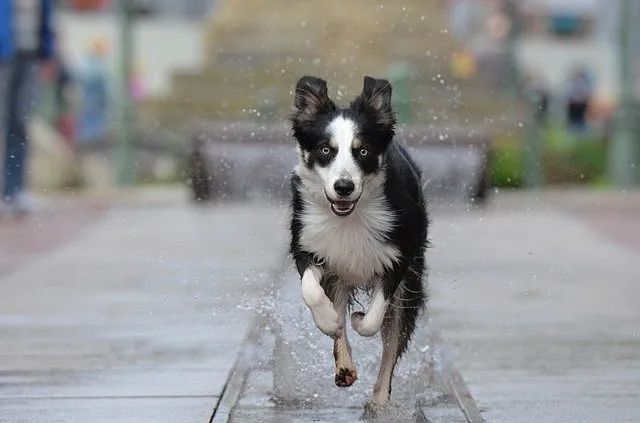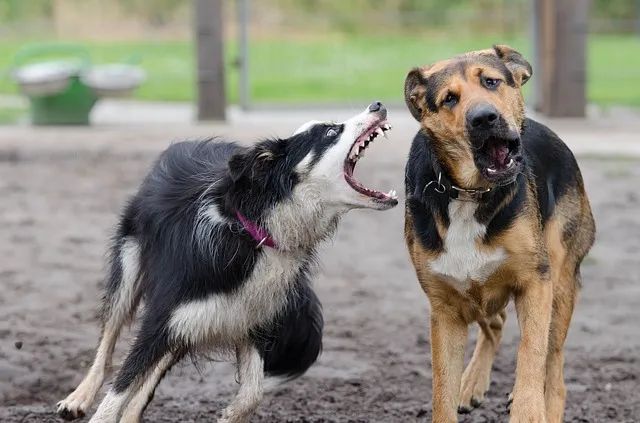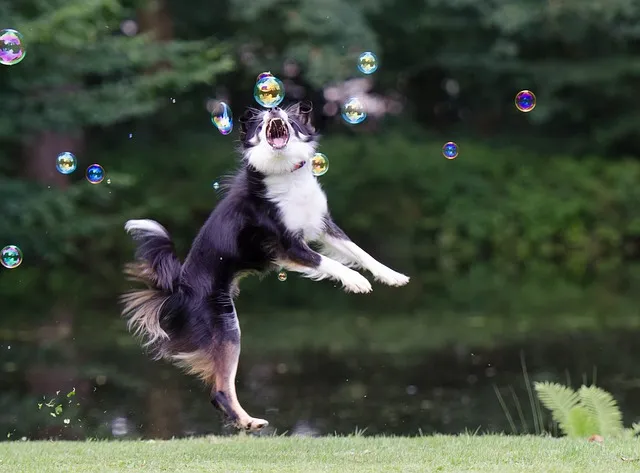Border collies are an extraordinary breed full of oodles of energy and intelligence which makes them easily trainable, quickly picking up commands.
All breeds need the training to become obedient and well-mannered, well=behaved dogs.
If you have a picture of Lassie, a well-known collie, in mind, lying contentedly by the fire, this may only be a dream, especially where other breeds and border collies are concerned.
Border collies along with any type of dog can dabble in unwanted behavior and this kind of conduct can take many forms.
What is considered bad behavior by one owner may not bother another, but one thing is for certain, anything you deem unacceptable behavior needs to be corrected and remedied pronto, and with consistency.
In today’s post, I will include information on border collie behavior problems.
Also added some information about border collie aggression and how to stop or reduce border collie aggression.

For your dog’s vitamin supplement, dog food, dog toys, or other dogs product please visit the Health Extension website.
Border Collie Behavior Problems
Many of the behavior problems below can also crop up in other breeds, so don’t naturally assume that your border collie is bad because they are misbehaving.
They just need to learn what is acceptable behavior and what is not.
Keep in mind that your -border collie is one of the most intelligent dogs on the planet.
They need mental stimulation that allows their mind to be busy and stay sharp. This keeps them from becoming bored and also, out of trouble.
Border collies also need plenty of exercise, to keep them healthy, tire them out and again, reduce boredom, keeping them out of mischief.
- Chewing
All dogs chew, especially puppies and it is a natural habit for them. Give your border collie acceptable toys to chew on, plus bones you can purchase that can also satisfy that chewing urge but clean their teeth in the process.
Keep a watchful eye on puppies so they don’t chew pillows or furniture and let them know this is not acceptable, giving them something appropriate for their chewing needs and rewarding them with positive praise.
- Barking
Border collies are quite energetic and can become quite excited, rambunctious, and yes, noisy.
Barking may be okay if your doorbell rings or your pup hears a suspicious noise, but constant barking is fun for no one.
Tell your pup, “no,” when barking, or “quiet.” Have a treat or special toy handy when they obey and are quiet.
- Herding and Nipping
Herding is an ingrained trait of border collies and sometimes along with it, there is nipping. This is not fun for anyone, but keep in mind that the mindset of the border collie is to keep everyone together in the same place.
This may seem cute or funny at first but when your family begins scattering in different directions readying for a busy day, having your border collie barking, chasing, and nipping will soon become annoying.
Let them know that this is not okay. Be especially mindful around toddlers and small children and the elderly, that can be knocked off balance by a nipping dog.
This is one trait that will never be completely broken but with diversions and satisfying them with plenty of “herding” games outdoors they will learn it’s not acceptable indoors.
- Jumping
Jumping should never be allowed unless,
of course, your pup competes in agility contests! Deter jumped right from the start as a puppy.
You may think it’s cute and adorable but as a weighty adult, this can be downright dangerous, especially for elderly visitors. Totally ignore them if you enter the house and they begin jumping on you.
Give them attention only when they are settled and calm. Have a cookie sheet handy and drop it on the floor when they jump.
They will be startled by the clatter and soon be reminded that jumping equals a really loud noise!
- chasing
This type of chasing entails chasing cars which can be dangerous for both you and your dogs.
Your border collie should be properly trained to walk on a leash and know when to heel. They need to learn that chasing cars, rabbits or other dogs will not be tolerated.
- Digging
Many dogs and especially border collies love to dig. This is also an ancestral trait that goes back to dogs and wolves burying their food.
This should be deterred unless you want a zillion holes to China in your yard. Supervise your pup when they are outside and give them toys to play with or play catch or frisbee with them.
If everything fails and you just can’t break them from digging, give them their very own pile of dirt in an out-of-the-way area in your yard and they can dig away!
Many dogs suffer from separation anxiety when their owners leave them home alone. This can lead to all sorts of behavior issues like chewing, scratching, and trying to get out, which can even lead to injury, and potty problems, in an otherwise house-trained collie.
Crate train as a puppy if you are someone who works outside of the home. This can be their safe area anytime.
Begin leaving your pup home for short periods of time and then increase your time away.
Keep in mind that no dog should be left home for very long periods. They do need to go to the bathroom just like you and me.
Make sure your border collie also has plenty of exercise before leaving them for the day and when you return.
Toys can keep them busy and some are even like puzzles that make them solve how to extract a treat and take time to figure it out!
To check your Border Collies’ health status or their DNA checks, please visit the Embark vet website for all the help you may need.
Border Collie Aggression

To make things perfectly clear, the border collie is not generally an aggressive breed. Yes; they can be a bit nippy, sometimes bossy, and very independent, found in their genes for that excellent herding ability.
Any breed of dog can become aggressive and there are reasons, some of which are understandable and some that are not.
Nobody wants an aggressive dog; one they cannot trust. This is one reason for obedience training.
Often ineffective training or inconsistency can cause an out-of-control border collie, one that doesn’t obey as it should, becomes stubborn, or keeps on with the same bad habits. Although a badly behaved border collie is not what you want, rarely does this behavior seep into aggression.
Why Would A Border Collie Become Aggressive?
- Lack of Socialization
All dogs need to be socialized and this should begin as a puppy and even when your pup is still with their breeder.
When you take your puppy home at eight weeks you should introduce them to as many experiences as possible; different people, places, sights, sounds, smells, noises, other dogs, etc.
Your collie will develop into a well-rounded adult that shows no fear or aggression towards anyone or anything with plenty of socialization.
Without proper socialization, dogs can become anxious, nervous, or fearful in certain situations. Puppy classes are a superb way of adding training and socialization with other people and dogs.
- Protection
Your border collie is protective of their pack and that is you and your family. Sometimes dogs can just sense something is wrong or a stranger is suspicious.
Of course, if there is danger or someone is truly trying to do harm to you or your family, aggression would be acceptable.
When your pup constantly sees everyone as a threat to you, this is when a problem arises with aggression.
This is why socialization plays such an important role in the development of your border collie.
- Territorial
If your border collie becomes territorial of its home, food, or toys, this is also a problem. As a puppy, you should be able to take anything away from your pup, including toys and food without any fuss.
Food aggression can be very dangerous especially when small children are in your household.
- Sick or in pain
If you are otherwise loving, the calm dog suddenly lashes out with aggression, this could be due to a medical issue. If your border collie is sick or in some sort of pain, this may be the problem.
If you touch your pup in a certain area and they growl or nip; bingo, something is amiss and you need to have them checked at the veterinary clinic.
- Routine Change
Your pup may show signs of aggression if there has been a change in routine at your home. Dogs, and especially border collies are creatures of habit and routine.
If there has been a death, a move, someone has gone off to college, etc., this could be your answer.
- Adopted Collie
If you have adopted your border collie from a shelter or they are a rescue dog, their past life can play a very important role in their behavior and temperament.
Dogs can’t talk and tell you about their former home but if they’ve been abused or mistreated, this can have a big impact on their personality.

Signs of Aggression
- Nipping
- Growling
- Barking
- Lunging or Snapping
- Tense, Taut Posture
- Teeth are Bared
- Chasing
- Hair is up on the back
How To Stop Border Collie Aggression and Prevent It.
- Socialization
To prevent aggression your border collie needs to be well socialized from a puppy on up.
- Exercise
Your border collie needs plenty of exercises to meet their in-bred desire for herding and to use up the tons of energy they possess.
Just as exercise helps humans deal with depression, anger issues, etc., exercise is good for your border collie’s overall health as well as its mind.
- Games
Sure your collie needs to walk and run but don’t forget about the games. With games, they get physical exercise as well as mental stimulation. Avoid rough play as this can get your pup to be too rough with nipping and biting and they’ll think this is acceptable behavior.
- Alpha
From day one your border collie needs to understand that you are the alpha leader of the pack. In certain stages of puppyhood, they may become stubborn and try to take over the alpha role.
This can lead to aggression, so they always need to know that you are in charge and you call the shots. This can be done in a patient, firm, but calm way. No need to yell and never get physical.
This only shows that force is okay. Be consistent. If something is wrong one minute, it can’t be okay the next. No flip-flopping or waffling.
- Positive Reinforcement
Give positive reinforcement for good behavior and calmness, with praise or treats. Give correction or ignore bad behavior, depending on what it is.
- Crate Train
You can use a crate for your pup for their very own safe spot. They can go there for rest or if children become too noisy and pesty. The crate, however, should never be used for punishment.
Obedience Training
Obedience training, beginning as a puppy and especially in a class setting can help both you and your pup immensely.
You will receive precious advice, tips and be shown exactly how to handle your pup. Your border collie will receive training, bonding with you, and very important socialization.
- Call in Reinforcements
If your border collie is showing signs of aggression and you are at your wit’s end and don’t know quite how to solve this problem, speak with your veterinarian.
They can see if it is related to a medical condition or they will have helpful suggestions. Your vet may refer you to a behavior therapist or a personal dog trainer for help.
Final Thoughts
Sometimes people may get puppies that have aggression problems due to heredity, but mostly a cheeky, misbehaving border collie is just that and requires time and proper training.
If you clearly think you are in over your head and need help with aggression or even training issues, speak with your veterinarian, pet behavior therapist, or trainer and get their opinion and advice.
Border collies are rarely aggressive and all dogs at one time or another have behavior issues. When raising your border collie, be consistent, patient, loving and most of all don’t forget to enjoy the ride!